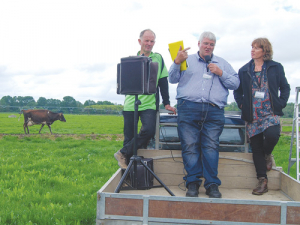DairyNZ Levy Vote Underway as Chair Highlights Seven-Fold Return
Voting has started for the renewal of DairyNZ's milksolids levy.
 Farm owner Alvin Reid (centre) address NZ Grasslands Association delegates while NZGA members Richard Robinson and Dr Jenny Jago look on.
Farm owner Alvin Reid (centre) address NZ Grasslands Association delegates while NZGA members Richard Robinson and Dr Jenny Jago look on.
The possible future of dairy farming was displayed in Canterbury recently to attendees of the NZ Grassland Association’s 78th annual conference, held this year in Timaru.
On the first day at least 300 farmers, scientists and industry people on a field trip visited two robotic milking farms in the Pleasant Point and Cave areas.
Riverholme Pastures (135ha), run by Alvin and Judith Reid, had been a dairy support and young stock grazing unit but was converted to dairying in 2013 with six DeLaval robotic milkers.
It is divided into three large blocks on an open-gates system, so the cows are free to make their own way to the shed at any time day or night. It is a highly automated system with a series of gates at the shed controlling the animals’ access to the robots, and cameras allowing remote monitoring even at night.
DairyNZ senior scientist Dr Jenny Jago, who led the eight-year ‘greenfield’ project which established the viability of robotic milking under NZ conditions, told the visitors about 20 farms here are milking by robots.
She says robotic milking was originally developed for European indoor cows, so a key challenge for the NZ project was to show that outdoor-grazing cows could make their own way to the sheds when they needed to.
“Farmers know cows are smart. But this is the project that really allowed the cow to show she is able to learn and contribute to the way a farm is run.
“All we do is put incentive and guidance in place for the cow and the rest she does herself.”
The field trip also took in the Moa Flat Dairy near Cave, where Alex Ulrich runs 300 cows under an indoor free-stall voluntary milking system, as well as the Ulrich family’s adjacent Rock Farm, primarily run as a dryland lamb and beef finishing unit and supporting Moa Flat.
Controls on the movement of fruit and vegetables in the Auckland suburb of Mt Roskill have been lifted.
Fonterra farmer shareholders and unit holders are in line for another payment in April.
Farmers are being encouraged to take a closer look at the refrigerants running inside their on-farm systems, as international and domestic pressure continues to build on high global warming potential (GWP) 400-series refrigerants.
As expected, Fonterra has lifted its 2025-26 forecast farmgate milk price mid-point to $9.50/kgMS.
Bovonic says a return on investment study has found its automated mastitis detection technology, QuadSense, is delivering financial, labour, and animal-health benefits on New Zealand dairy farms worth an estimated $29,547 per season.
Pāmu has welcomed ten new apprentices into its 2026 intake, marking the second year of a scheme designed to equip the next generation of farmers with the skills, knowledge, and experience needed for a thriving career in agriculture.
OPINION: Staying with politics, with less than nine months to go before the general elections, there’s confusion in the Labour…
OPINION: Winston Peters' tirade against the free trade deal stitched with India may not be all political posturing by the…